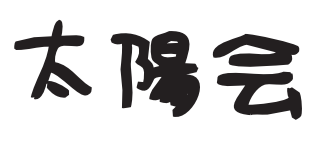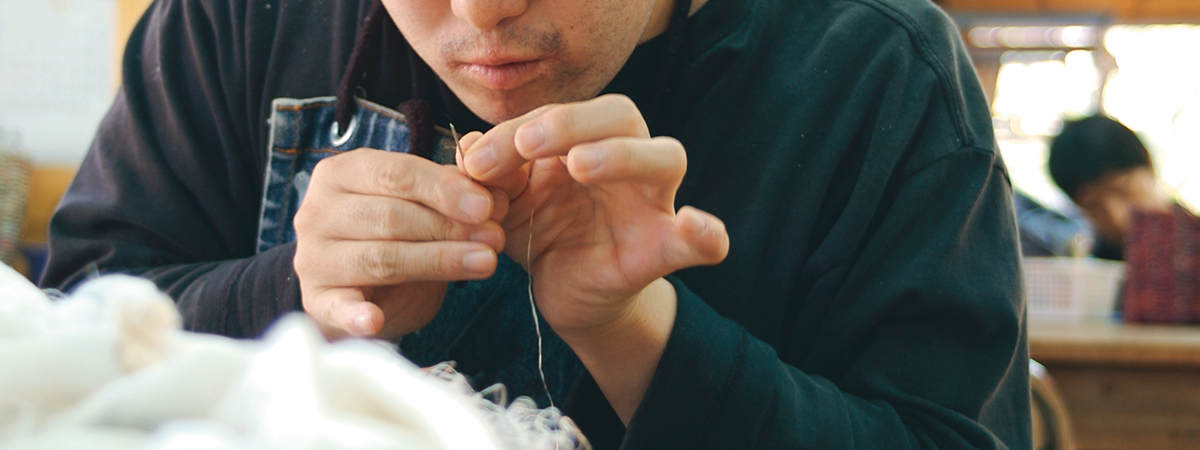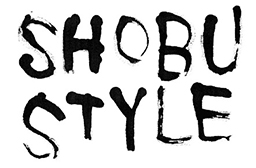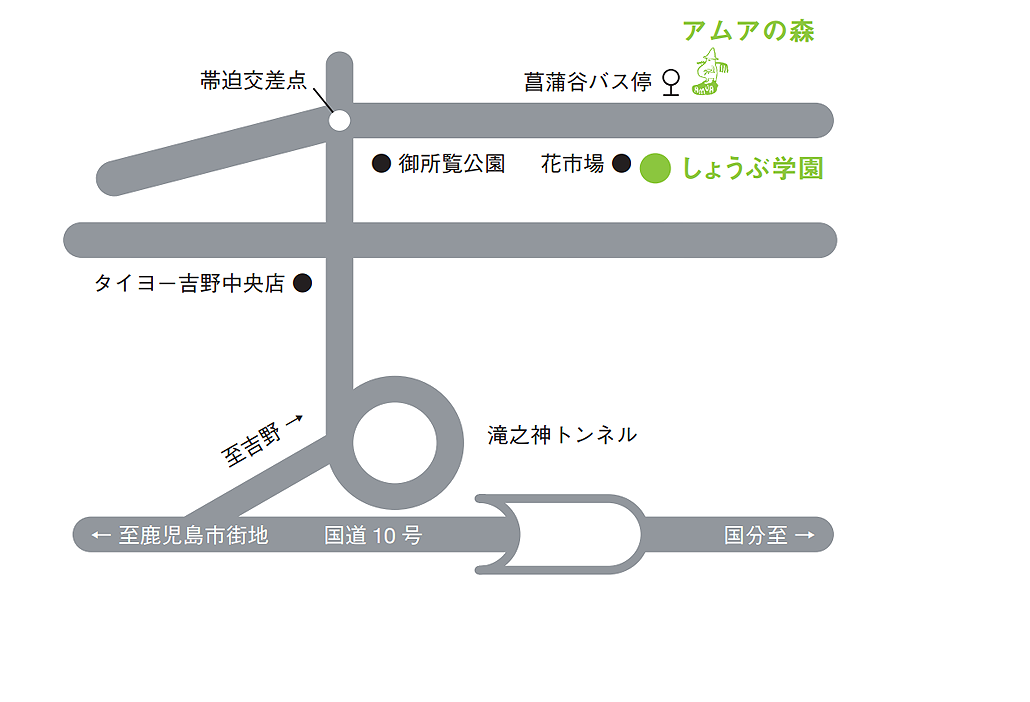ここには、人と場が響きあう暮らしがあります
鹿児島市の中心部から東北へ10キロ、吉野台地の一角にしょうぶ学園はあります。秋深く、稲荷川の上流、滝の神あたりから桜島を目の前にした磯の裾野一帯にかけての山間は、朱、黄、茶とりどりの紅葉に染まります。春ともなれば南国に日差しは初夏を思わせ、山は一面濃い緑に輝きます。 こうしたゆたかな自然環境のなか、しょうぶ学園は1973年、知的障害者援護施設としてスタートしました。周囲は急速な都市開発によって大きく変貌していきましたが、太陽会の“わが家”には、昔ながらの木々が生い茂り、ゆったりと咲きほころぶ花々や緑のたたずまいを見ることができます。
創立記念に植え込んださくら並木やせんだん、けやき、もみの木も年月とともにずいぶん大きくなって、憩いの場に影をおとしてくれています。
ここに樹齢250年のたぶの大木は、ここ吉野町菖蒲谷のいにしえの記憶を今に伝えるように、大きな枝を悠々と風に揺らし、野鳥たちが群れ羽ばたいています。
私たちは、この先人たちから受け継いだ自然の恵みを大切に守りながら、創造的で刺激的なコミュニティをつくるために数々の先進的な試みを行ってまいりました。1999年の在宅デイサービスセンター Doしょうぶの開設、2007年の新キャンパス完成を大きな区切りとして、2019年にはアートホールを備えた子どもたちの支援施設「アムアの森」を開設し、歴史を創ってまいりました。私たちの暮らすこの場所が、人と環境の持続可能な未来を描く人と環境のインターフェイスとして存在し、障がいのあるなしに関わらず、この場に集うことをとおして多様なコミュニケーションが生まれ、人々が幸福に繋がっていくことを願っています。
その人がその人らしく生きるためのスタイル
障害者支援センター<SHOBU STYLE>は、障がいを持つ人たちが地域社会でよりよく暮らしていくために、友好的で、安全で、のびのびとできる環境を提供しています。
障がいのあるなしに関わらず、支援を必要とする人、支援を提供する側といった枠を取払い、ものづくりをとおして、人が本質的に備えている創造する力を引き出し、ともに協働する者としてよろこびをわかちあえるコミュニティづくりを夢見ています。
人と人がささえあい、つながりあい、つくりだすくらし、私たちは創造的な福祉事業の可能性に貢献したいと思います。
私たちSHOBUの仕事は、「ささえあうくらし―自立支援事業」「つくりだすくらし―文化創造事業」「つながりあうくらし―地域交流事業」の創造です。これら3つの事業は互いに関わり合い、影響し合いながら、障がいを持つ人たちの創造的能力を引き出すことをとおして、社会とよりよく関わっていくためのプログラムを開発し、提供しています。SHOBU独自の専門性とマネジメント技術を生かしながら、その人がその人らしく生きるためのケア・プログラムをご家族とともに考えていきたいと思います。
事業システム図
Project System Diagram
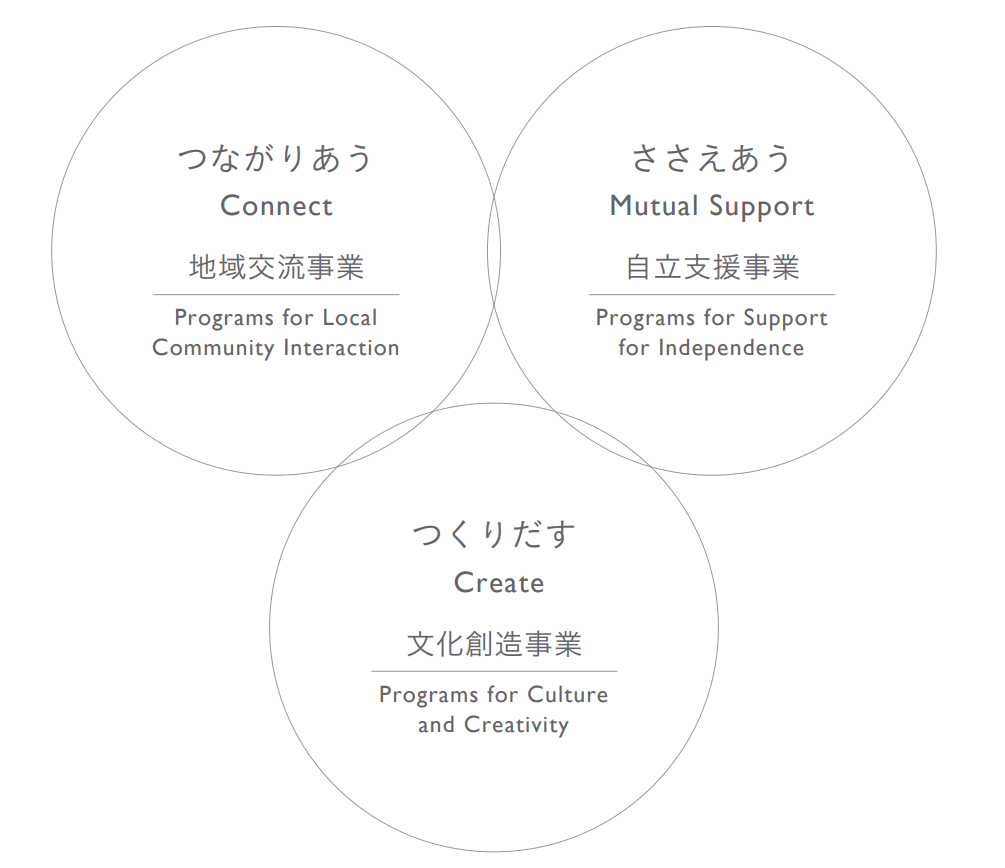
Life in a place people and place resonate together
Shobu Gakuen is located on a corner of the Yoshino Plateau, ten kilometers northeast of the Kagoshima city center. In the fall, the terrain, from the mountains from the upper reaches of the Inari River and Takinokami to the seaside in front of Sakurajima, turns red, yellow, brown--all the colors of autumn foliage. In the spring, the sunlight in this southern region seems like early summer, and the mountainsides glow with the deep green of new growth. It was in this magnificent setting that Shobu Gakuen was founded in 1973 as a facility supporting people with intellectual disabilities. Its surroundings have changed considerably over the years due to rapid urban development, but the Taiyo-kai’s home is still filled with trees, flowers, and green as far as the eye can see. The cherry trees planted to commemorate the founding of this institution and the many other varieties of trees grow larger, year after year, casting their benevolent shade over this place of ease. The huge laurel tree, believed to the 250 years old, brings memories of the old days of Shobu-dani in Yoshino-cho to us on its sturdy branches, waving in the breeze, where clusters of birds gather.
While cherishing and preserving the natural beauties of this place, gifts from the past, we have carried out a variety of pioneering experiments here in order to build a creative, stimulating community. We opened Do Shobu, the Day Care Support Center in 1999, and with the completion of our new campus in 2007, and the establishment of Amua no mori, the support center for children holding an art hall in 2019, we have created our own history. We will preserve the old Shobu Gakuen as an interface between the human beings who depict a sustainable future for humanity and the environment. We hope that by gathering here, people--with or without disabilities--will communicate with each other in many ways and connect joyfully.
Each person lives in his or own way
SHOBU STYLE, our support center for persons with disabilities, creates a friendly, safe, relaxing environment in which people with disabilities can live more comfortably in their local community.
Our dream is to create a community in which disabilities do not matter, in which the categories of person needing support and provider of support disappear, in which through making things people can exercise their innate creative abilities and share the joy of creating and collaborating together.
We hope to demonstrate the potential for creative social welfare programs through lives which allow people to support each other, connect with each, and create.
Our work at SHOBU consists of three programs: Life for Mutual Support--Support for Independence; Life that Creates--Culture and Creativity; Life that Connects—Local Community Interaction. These programs are of course related and affect each other as we develop new approaches to enabling persons with disabilities to build a better relationship with the wider society through drawing out their creative abilities. While making effective use of SHOBU’s specialized nature and management techniques, we work together with the family members of our clients to consider what the best care program to enable each to live a decent human life would be.
ケアや福祉の対象として見られることの多い子どもや障がい者が、 芸術活動を通して新たな自分と出会うことによって、 生きがいのある自信と自立感を獲得し、相互にエンパワメントを高めながら、 これまでにない新しい共存する関係性を創っていくこと。
子ども向けのプログラムと連携して「本物に触れる」ことの大切さ、 子どもたちの芸術、表現活動への興味や関心の種を育て、 既成の枠組みを越えた異文化のアーティストとの交流等により、 感動を他者と分かち合える機会を提供すること。
普段、芸術に触れる機会の少ない地域住民に対して、音楽会、展覧会、演劇のほか、 ワークショップの開催等、芸術を体験する機会を提供することで、文化 ・芸術を地域に広く普及させるとともに、地域における文化施設として機能すること。
地域の郷土芸能、伝統行事の紹介や保存、町内会行事への開放など、 地域の人と人との交流を図り、コミュニティの活性化、 地域に対する愛着や誇りの回復など、 芸術が地域再生に結びつくきっかけとなるような役割を担うこと。
人的環境、自然的環境によって人間がより快適に生活できる空間の創造をテーマに、 「知足安分」の精神に学びながら必要な大切な環境を考えていく。換言すれば、美しい心の環境づくり、 美しい地球の環境づくりについて、貢献できることを模索すること。
Respecting the each other’ s empowerment, we build a new relationship with society by providing children and people with disability, who are often seen as targets to be helped, the opportunities to gain confidence and sense of autonomy, that keeps them going forward, through artistic experiences.
Associating with children’ s educational programs, we introduce children the opportunity to experience the genuine artistic activities to grow the source of their natural curiosity and interest. We also provide children the cross-cultural exchange with artists to share their feeling of excitement with others.
Having concert, play, exhibitions, and workshops, we offer the opportunities to experience real art performances to our community and neighbors, who feel little familiar with them. We take the key role to spread culture and art widely to our community as a local art center.
We are engaged in interacting with community by introducing and preserving folk entertainments and traditional events, and opening the gate to our local events. We believe that our spirit of culture and art revitalizes neighbor’ s attachment and pride to the community.
Learning from the spirit of “知足安分-Chisokuanbun” , which means not to make hope but to be satisfied with the current place and condition, it is important to create the comfortable environment that we truly need and value for humans and nature. In other words, our challenge is to search for the ways to contribute to creating beautiful environment for our minds and the planet.
社会福祉法人 太陽会
法人名:社会福祉法人 太陽会
事業総称:障害者支援センター SHOBU STYLE
施設名:
・ライフサポートセンター「しょうぶ学園」
・デイサービスセンター「Doしょうぶ」
・しょうぶ文化芸術支援センター「アムアの森」
・地域生活支援センター「相談支援センターしょうぶ」「Beしょうぶ」「グループホームしょうぶ」
従業員数:125名(2020年4月現在)
設立:1973年(昭和48年)4月1日
所在地:鹿児島県鹿児島市吉野町5066番地
太陽会理念
私たち太陽会は、人と環境を考えることを第一に、社会福祉の分野で貢献しています。
一、人間理解と人間尊重
「己の欲せざるところ人に施すことなかれ。」(孔子)相手の立場に立って考えます。
二、地域福祉と地域貢献
地域の歴史、風土と密着した活動への積極的参加や地域ボランティア活動などの交流活動を通して、地域の拠点として温かみのあるコミュニティーづくりを目指します。
三、文化芸術活動の推進
工芸・芸術・音楽等を中心に、文化活動への積極的参加とエンパワメント支援のためのプログラムと実践を創造的に創出します。
役員構成
【理事長】福森 悦子
【理 事】福森 伸/森 一彦/谷口 慶太/川野恭和/飯山 智史
【評議員】中村 俊久/相良 有一/有村 茂樹/門田 晶子/新里 道明/惠原 要/上谷 裕子/玉利 勇治
【監 事】大島 正晴/山下 美貴子
社会福祉法人太陽会 公表書類
社会福祉法人太陽会 定款
社会福祉法人太陽会 収支決算報告書
1973
知的障害者更生施設「しょうぶ学園」設立(定員50名)
1974
作業指導班(大島紬・園芸・竹細工・下請け作業)の設置
1985
作業活動を「工房しょうぶ」として活動開始
1988
しょうぶ学園入所寮(太陽寮)増設(定員70名)
木の工房(木工)設置
布の工房(染め織り・刺繍)設置
1990
土の工房(陶芸)設置
1992
nui project 活動開始
1993
紙の工房(和紙) 設置
園内ギャラリー「デポ1」設置
1994
園内ギャラリー「デポ2」設置
1995
グループホーム95開設(定員5名)
1997
グループホーム97開設(定員4名)
パン工房「ル・カリヨン」 設置
1999
在宅知的障害者デイサービスセンター「Doしょうぶ」開設
2000
グループホーム2000開設(定員5名)
2001
障害者小規模通所授産センター「クラフトしょうぶ」開設
2002
知的障害者ホームヘルプサービスセンター開設
2003
障害者施策が措置制度から支援費制度(契約)へ移行
2004
グループホーム2004開設(定員4名)
2005
自立支援法へ一部体系移行
デイサービスセンター「Doしょうぶ」
生活介護事業(定員20名)/自立訓練事業(定員10名)
ホームヘルプサービスセンター「Beしょうぶ」
居宅介護事業/行動援護事業
地域生活ホーム「ケアホームしょうぶ」
共同生活介護事業/共同生活援助事業
(グループホームをケアホームに名称変更)
ケアホーム2006開設(定員7名)
ケアホーム「さくらハウス」開設(定員2名)
2007
入所支援施設「しょうぶ学園」改築完成(定員60名)
園内ギャラリー「Sギャラリー」設置
2008
障害者小規模通所授産センター「クラフトしょうぶ」事業廃止
就労継続支援B型事業 増員(定員20名)
パスタ&カフェ Otafuku開設
ケアホーム2008開設(定員4名)
ケアホーム「つばきハウス」開設(定員6名)
しょうぶ学園 定員減員(定員50名)
2009
地域交流スペース Omni House(オムニハウス)開設
2011
就労移行支援事業開設
そば屋 凡太開設
しょうぶ学園定員減員(定員40名)
ケアホーム「たぶの木ハウス」開設(定員7名)
2012
相談支援センター「しょうぶ」開設
2019
しょうぶ文化芸術支援センター「アムアの森」開設(定員60名)
2020
グループホーム「たぶの木ハウス2」開設(定員8名)
2021
グループホーム「ヨコノハウス」開設(定員4名)
グループホーム「ホロホロハウス」開設(定員10名 ショートステイ2名)
2023
グループホーム「ホロホロハウス2」開設(定員7名 ショートステイ1名)
交通のご案内
○ JR鹿児島中央駅より
鹿児島中央駅・天文館方面から南国バス利用。吉野方面、中別府団地行き・宮之浦団地行きに乗車、菖蒲谷バス停下車。徒歩1分。(天文館より30分)
○ 鹿児島空港より
鹿児島空港より空港リムジンバス利用。鹿児島市内方面、吉野(早馬)バス停下車。南国バス乗り換え、中別府団地行き・宮之浦団地行きに乗車、菖蒲谷バス停下車。徒歩1分。 (空港より50分)
施設見学について
『しょうぶ学園』ならびに『アムアの森』内見学については、可能な範囲で対応をさせていただきます。1週間前までに事前のご予約が必要となります。ご希望の方は、
info@shobu.jp までご連絡をお願い致します。
○ 見学可能日時
水・金曜日 午前の部 10:00~12:00 / 午後の部 13:00~15:00
○ 見学料
1人当たり2,200円(税込・資料代こみ) / 資料 1部300円(税込)
※他のお客様と合同でのご案内になる場合もございます。
※法人行事等により、お断りさせて頂く場合もございます。

